It is highly recommended that you hide valerian from your cat. You should not give it to your cat for fun. Alcohol is harmful to the human body, and it is even more dangerous for animals. Valerian mixed with alcohol can seriously harm your pet, and the alcohol in the medicine can cause:
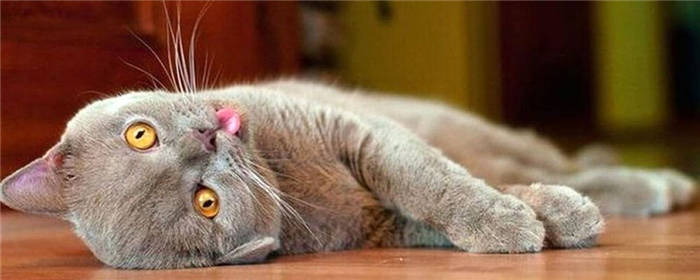
- What happens to a cat if you give it valerian. Is it dangerous?
- If you give a cat some valerian…
- How Valerian works on cats
- Useful essential oil
- What are the dangers?
- Why cats like valerian and how valerian works on them
- Can I give cats valerian?
- What is valerian and catnip for cats
- How Valerian and catnip affect cat behavior
- How does valerian root affect cats?
- What is in valerian?
- Why does actinidine have such an effect on cats and felines?
- Do all cats react to valerian?
- About the harm of valerian for cats and cats.
- When do they give cats valerian?
- A substitute for a good mood.
What happens to a cat if you give it valerian. Is it dangerous?
Many have noticed that cats, after receiving a certain "dose" of valerian, become completely inadequate. But not everyone knows about the effect of this medicine on the cat's body, whether it is good for the animal or, on the contrary, harmful, and what you should expect from a cat who gets to the valerian.
This medicinal plant, otherwise known as "cat grass" or "maun grass," because its smell alone makes cats not themselves. This perennial herb grows near bodies of water and in low-lying areas as well as in wetlands.
Even at a very decent distance, the cats smell this plant, and immediately rush to it. And then something like madness begins – the cats rub on this grass, roll, jump, trying to damage the stem so that the sap that they lick off can flow. As they do so, the animals meow loudly. It is noteworthy that for humans, valerian is a sedative, while for cats it is a strong stimulant.
If you give a cat some valerian…
The owners of tabby-eared cats have long noticed that if you give the lid of the bottle with this medicine to smell the cat, he immediately clings to it and will lick it, and no one for anything will not give it away.
Then the strangeness begins: even a calm pet can make a whole mess in the house – tear curtains and wallpaper, howl, roll on the floor. It is proved that drugs have the same effect on a person – hallucinations begin, struggle with an invisible enemy, etc.
How Valerian works on cats
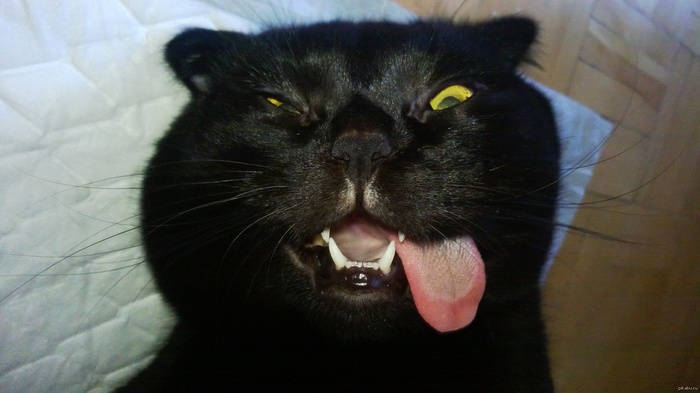
Valerian is known to everyone as a sedative. Its sedative properties are used to treat insomnia, neurosis, nervous fatigue. But here's a paradox! On cats, it acts excitatory! Tailed simply fall into hysterics and seizures at the smell of it! What was it? Why does it affect cats differently? And should cats even be given valerian to sniff?
Valerian is a perennial.
It grows mainly near ponds, in marshy soils, in lowlands. Its stem is high and thick. The plant can reach a height of two meters. Its flowers are pinkish and clustered in umbrellas. The root of this medicinal plant is used for pharmacological needs. It is short and loose. In its composition, valerian root contains the following acids: formic, isovalerian, acetic and palminthine. There are also triterpene glycosides and valepotriates in the root. You should know that isovaleric acid causes burns if it comes into contact with mucous membranes.
Medicinal valerian also has other names: cat root, meow and cat grass. So people call the herb for a reason. Zoologists have studied the mechanism of valerian's effect on cats and have made the following conclusions: the smell of this plant is very similar to the smell of pheromones contained in the urine of mature animals. Valerian has a stimulating effect on most cats. It changes the emotional and hormonal background of tailed cats. A further possible reason for the effects of valerian on cats is that the plant's root contains actinidin, a substance which is highly excitable. Even a calm cat by nature under the influence of valerian turns into an inveterate troublemaker. The pet can roll on the floor and howl loudly, tear the hair and wallpaper, swing on curtains and even pee in the corner. Valerian influences cats as a heavy narcotic, which fundamentally changes their behavior. Veterinarians believe that the drug can even cause hallucinations in the form of attacks on some non-existent object or, conversely, running away from an imaginary pursuer. Some animals are intimidated by valerian. They are then afraid of any sound, will hide at rustles. Gentle and old cats under the influence of valerian are capable of clawing at a person's face.
Useful essential oil
Valerian has a beneficial effect on people because it contains an essential oil that normalizes heart function, relieves muscle spasms, improves bile secretion and stimulates the secretory function of the stomach. In other words, valerian is quite useful for us. With cats, on the other hand, the opposite is true. Their reaction to valerian resembles the behavior of a drunken alcoholic. The animals begin to go crazy: rolling around on the floor, goggling, drooling, running around the apartment, greedily licking up liquid residue, purring loudly, or simply screaming wildly. Sometimes there are more violent reactions, which can be quite frightening for the owners. A cat may hiss at its owner, try to bite him, attack a nonexistent enemy or hide from him. In general, behave like a human, drunk to the devils or "squirrel".
The action of the herb lasts about quarter of an hour, then the cat comes to itself. True, there are "side effects": the animal may become lethargic and drowsy. But why does valerian have such a strange effect on cats, leaving other animals completely indifferent?
What are the dangers?
If your cat managed to get to the tantalizing infusion and consumed some of it, and after a lot of fun he suddenly falls into a restless sleep – urgently take him to the vet clinic or call the vet at home in an emergency. It may be an overdose, and if veterinary care is not provided in time the consequence may be fatal.
However, for all the negatives, there are cases where a professional veterinarian himself recommends the use of valerian for your pet. These are very rare cases, and the dosage is very small.
The reason for prescribing this medicine to cats can be heart problems or GI problems. In such cases, the drug has a positive effect on the body, but only the minimum dosage can be given. Moreover, the dosage is set by the veterinarian himself for cats, and you can use valerian only in the form of drops. Good health to you and your pets!
Why cats like valerian and how valerian works on them
Cats love valerian extract in a magical way: they meow, purr, romp on the floor and show a passionate tenderness at their owner's feet. The reason is that valerian essential oils strongly stimulate the cat's nervous system, there is a hormonal surge, and cats experience a feeling of euphoria.
There are several opinions about the true causes of such a reaction to valerian. The most common is that the scent resembles pheromones and causes an irresistible urge to mate. Another explanation is that valerian is a natural remedy with which wild individuals treat ailments by seeking out the root of the plant on their own. However, not all cats have such an acute reaction to valerian, there are some who treat this smell completely calmly.
Can I give cats valerian?
Veterinary experts are sure: for fun, even in small doses, this should not be done. Valerian for calming a cat does not help. Sometimes veterinarians prescribe valerian as an antidepressant for pets. But it is desirable to use this medicine as consciously as possible and only if absolutely necessary.
It may seem that the tablets are less dangerous than the tincture, due to their minimal alcohol content. But this is not the case. In addition to valerian, the tablets contain synthetic substances that are much more harmful than the herbal extract. They can lead to allergies and severe poisoning.
If the pet does try valerian and after a quick euphoric effect immediately falls asleep – you must immediately take her to the veterinary clinic and consult with a specialist.
What is valerian and catnip for cats
Valerian is a medicinal plant known for its sedative properties. The roots and rhizomes of this plant are used to produce a human medication with sedative properties, which can be purchased over-the-counter at the pharmacy in some countries. In addition, valerian contains chemical compounds that have an effect on the nervous system of cats. Isovaleric acid is one of the main active components of valerian. It affects receptors in the feline nervous system that are responsible for food digestion, sleep, wakefulness and play behavior.
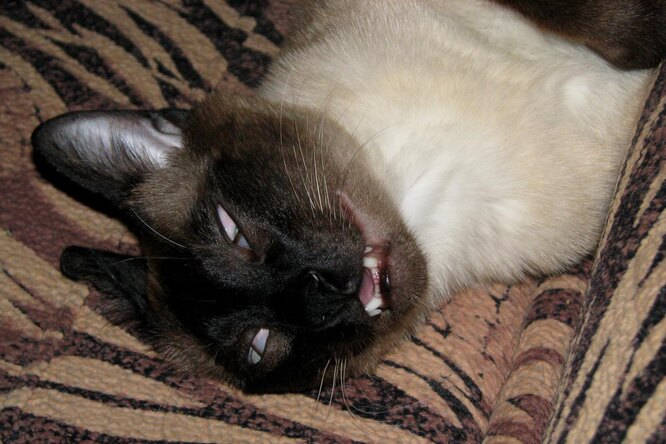
Catnip, or catnip, is an herb in the sponge family known for its minty aroma. The herb contains the chemical compound nepetalactone, which is what cats respond to. When a cat sniffs catnip, the oils and chemical compounds in it stimulate its receptors in its nose. This exposure stimulates the sensitive nerve cells in the brain that control behavior and emotions. Interestingly, other animals and people don't usually have the same reaction to catnip that cats do. Although sometimes people may use the plant as a soothing tea.
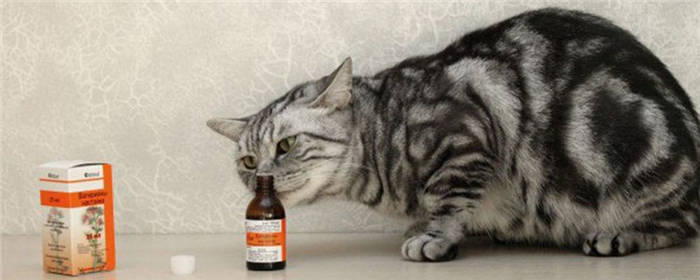
How Valerian and catnip affect cat behavior
Valerian and catnip can cause different reactions in cats, depending on their individual characteristics and the dosage of the plant. One of the most common reactions cats have to valerian and catnip is agitation. Cats may start running, jumping, purring, looking for toys, or just being anxious when they are near these plants. Some cats may feel relaxed or drowsy after contact with valerian, while others may become aggressive. It's important to note that you have to be extremely careful with valerian. After all, its smell reminds cats of pheromones that are produced by the opposite sex. Which can become a real drug for the animal.
Excessive use of valerian and catnip can be dangerous to your pet's health. Valerian, for example, can cause health problems in a cat if it is ingested in large quantities. An overdose of valerian can lead to vomiting, diarrhea, decreased appetite, and heart and respiratory problems. Catnip, on the other hand, can cause stomach and intestinal problems in cats if consumed in large quantities. It can also cause vomiting, diarrhea and other digestive problems.
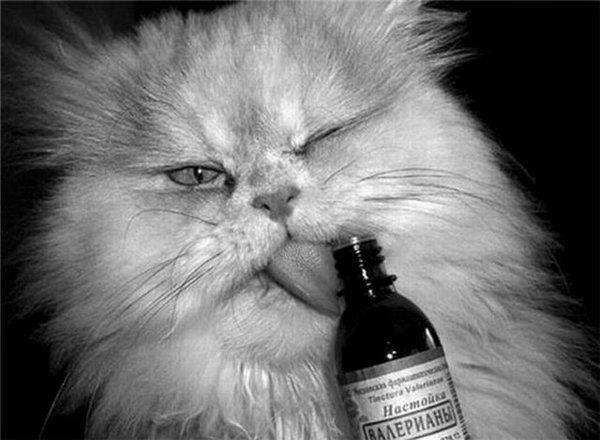
How does valerian root affect cats?
Humans are positively affected by the plant itself and the medicines derived from it. The root and its preparations refer to sedatives, sedatives. On this basis, a person believes that it has a similar effect on the animal. However, this is far from being the case.
Valerian for cats is a remedy "three in one":
- An energizer that increases excitability, but it is short-lived.
- It is a sleeping pill, which causes lethargy and fatigue, coming after the first phase of exposure to the plant.
- Lethal drug, under the influence of which not only changes the psyche of the animal, but also leads him to death.
Many people may be amused to observe the behavior of the always calm cat, which under the influence of valerian root suddenly changes before their eyes: excitedly yells, rolls on the floor, rushes around the rooms, attacks all the enemies he saw. After a short rampage, he falls into a state of lethargy, softens and falls asleep tiredly.
This resembles the behavioral reaction during stress, when there is an inadequate reaction to external stimuli, there is aggression, anxiety, followed by helplessness. So why does the remedy we use as a calming agent cause the furry to become stressed?
What is in valerian?
According to scientists, valerian contains a set of pheromone chemicals capable of influencing the behavior of perceiving creatures. The main component in the plant is actinidin, a potent irritant to the central nervous system of cats.
Inhaling the smell, the cat's neurons are activated, the animal "turns on", ceases to control itself, it begins to hallucinate. After the rampage, the cat's body triggers inhibitory mechanisms, when the heart rate decreases and breathing slows down. The animal, as they say, "floats" and falls asleep.
Abrupt change from hyperactivity to complete relaxation is harmful to even the strongest young body. In this case, the animal's brain suffers, which leads to serious changes, both physiologically and mentally.
Why does actinidine have such an effect on cats and felines?
The presence of actinidin in the atmosphere signals the presence of a member of a kindred tribe in the inhabited territory. The natural reaction of a cat is a desire to protect the property, a desire to dominate, to demonstrate sexual attraction.
The fact is that actinidin is similar in smell to phelinin, a substance in the urine of mature felines. The main way to mark your territory is to mark it. By these marks an animal can learn the whole history of its fellow-cat's pastimes. Naturally, the presence of a foreign creature activates the reaction of the owner of the surrounding area.
Thus, there is a confusion of scents actinidin and felinin, triggering natural instincts and behavioral patterns in cats. This is why almost all cats like valerian. The high concentration of actinidin causes a violent reaction in them, which takes a lot of energy. This is why the animal feels apathetic and drowsy after a strong excitement.
Do all cats react to valerian?
It should be noted, the degree of reaction to the smell of valerian varies among cats. It all depends on individuality.
It has been observed that one third of the feline tribe remains indifferent to the smell of valerian. Among them are kittens who have not reached puberty (far from natural instincts) and Siamese cats/cats. Actinidine has no effect on them.
About the harm of valerian for cats and cats.
Surely many have seen funny videos of ordinary house cats behaving inappropriately, to say the least. Often this is caused by exposure to valerian. For fun, the owners of the fluffy decided to see with their own eyes what valerian does to cats. So what happens if a cat is fed this medication? How dangerous is valerian and how does it affect the animal's body?
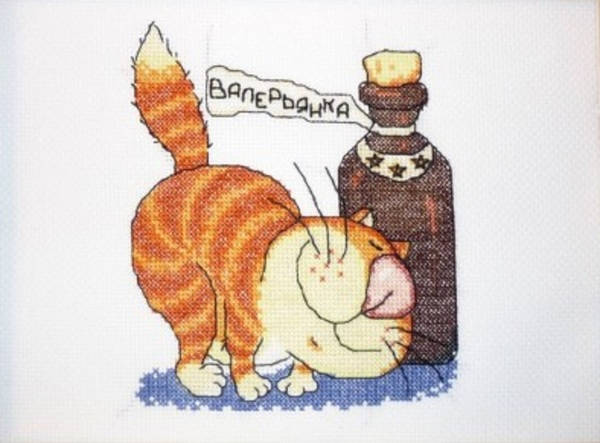
Before offering the tincture to the animal, it is recommended to get to know the plant better:
1) Valerian is a perennial herbaceous plant.
2) The habitat of this plant is reservoirs, lowlands and marshy soils.
3) The plant has a thick and tall stem (about two meters), and pink flowers collected in an umbrella.
4) Only the short, loose and branchy root is used in pharmacology.
It is worth considering the fact that most of the constituents of valerian can cause burns to the intestines or mouth by getting on the mucosa.
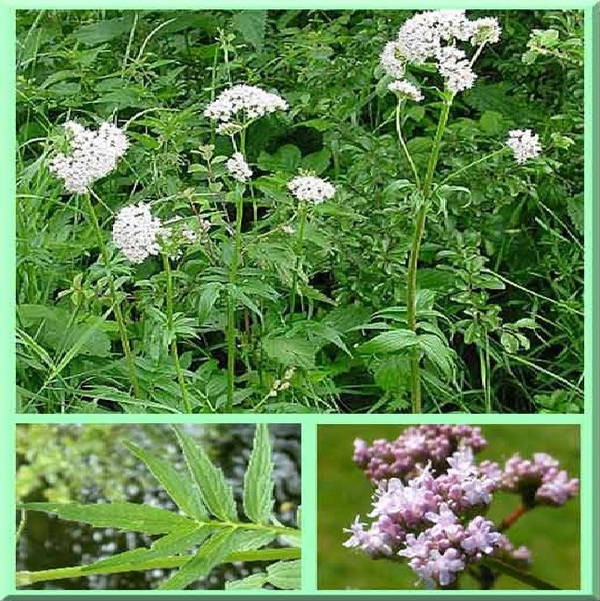
Let's go deeper into the question of whether it is harmful to give valerian to cats, why it has such an effect on them. Zoologists have come to surprising conclusions. The aroma of the plant is extremely similar to the pheromones contained in the urine of an adult mature cat. The arousing effect of valerian changes the hormonal and emotional background of the animal. Considering that valerian affects the cat's central nervous system, changing the cat's perception of reality, this subsequently becomes the reason for such inadequate behavior.
For many decades, mankind has used valerian as a therapeutic infusion that is non-threatening. Tinctures and decoctions can calm the nerves, improve a person's quality of sleep, and relieve pain by relieving a person's spasms. With cats, however, things are different.
When do they give cats valerian?
Veterinarians do not advise giving cats and cats valerian tincture in drops. Some owners experiment and prescribe the drug themselves to pets if they are characterized by increased aggressiveness.
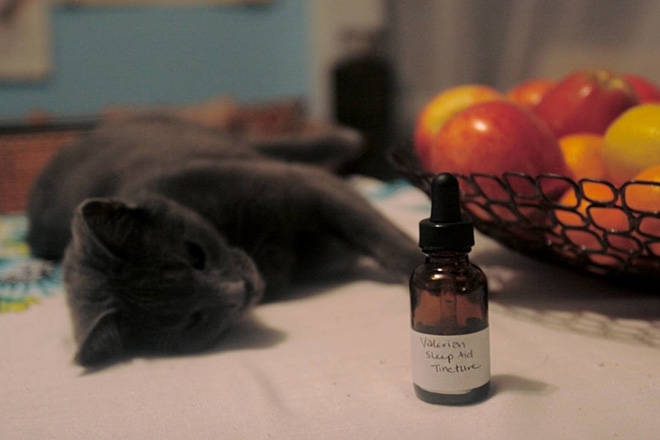
There are cases when cats are given valerian before long journeys, so that they behave calmly on the road. This should not be done – valerian is designed to calm the nervous system of people, but not animals. However, there are exceptions. Paracelsus said, "Only the dose makes the cure a poison and the poison a cure." There are rare occasions when veterinarians prescribe this drug to animals.
Only a doctor determines whether a cat or cat can take valerian in liquid form and how many drops can be given. In cats it is acceptable to give valerian in very small amounts and only in the form of drops.
Reasons for such treatment may be gastrointestinal problems, heart ailments, thyroid disorders. Felines also experience stress. Sometimes the nervous turmoil can be quite severe, the pet falls into a deep depression, refuses to eat. Only after ruling out other diseases that may have caused such symptoms, the veterinarian prescribes valerian. This is an extreme measure, the treatment is a course and under vigilant medical supervision.
Can I give cats and cats valerian in tablets for sedation? There is a misconception among owners that valerian tablets do not harm cats because they do not contain alcohol. This is a misconception, tableted valerian is even more dangerous to the cat's body than an alcoholic tincture. The tablets contain only one-fourth of the pure extract of the plant, the rest being auxiliary substances. These constituents contribute to the rapid dissolution of the tablet in the human body, but not in the feline body. In cats, they can cause poisoning, severe allergies and even death.
A substitute for a good mood.
Dried catnip herb, also called catnip, is available at veterinary drugstores and animal specialty stores. Cats can sniff and taste it. The effect of this herb on the pets' mood is similar to that of valerian, but harmless to their health. Catnip makes them cheerful and active, sometimes on the contrary – calm and peaceful.
It's all about essential oils, specifically nepelactone, which is attractive to all members of the feline family. Of course, we must take into account that in large quantities catnip can also be harmful. In reasonable doses, it enhances the pets mood and attracts attention, for example, to the scratching post or sleeping place. Catnip extract is added to the filler for toys, in cots, given as a sedative before transportation and participation in shows.
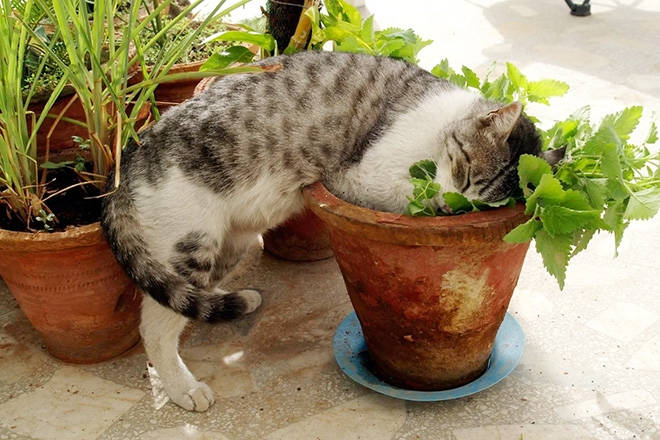
- As a natural remedy for the correction of animal behavior.
- As a lure for accustoming the litter box.
- As a natural sleeping pill (if the pet responds to it as a sedative).
- To increase activity (if the cat responds to it as an invigorating supplement).
- To improve appetite, especially after illness and surgery.
- As a reward for training.
- Before going to the veterinarian (as a sedative and normalizing emotional background).
- For prophylaxis against worms. Catnip has an antiparasitic effect.
- When stressed – for example, when another animal appears in the house or due to circumstances, when the cat has a change of owner.
- To improve the gastrointestinal tract.
We should not forget that the health of our pets is in our hands, and that a minute of fun with a seemingly funny behavior of a cat or a cat can have a devastating effect on his health and well-being. We are responsible for what we have tamed.






